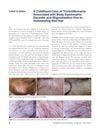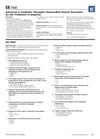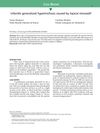 7 citations,
June 2020 in “Journal of Cosmetic Dermatology”
7 citations,
June 2020 in “Journal of Cosmetic Dermatology” Turkish women with hirsutism experience lower quality of life, especially those with PCOS, regardless of hair growth severity.
 73 citations,
March 2009 in “Seminars in Cutaneous Medicine and Surgery”
73 citations,
March 2009 in “Seminars in Cutaneous Medicine and Surgery” The document concludes that accurate diagnosis of hair disorders is crucial and requires a range of diagnostic methods.
 26 citations,
February 2011 in “Anais Brasileiros De Dermatologia”
26 citations,
February 2011 in “Anais Brasileiros De Dermatologia” Polycystic Ovary Syndrome can cause hair loss and skin issues, and early treatment is important for preventing complications.
 26 citations,
August 2006 in “Journal of Clinical Pharmacy and Therapeutics”
26 citations,
August 2006 in “Journal of Clinical Pharmacy and Therapeutics” Some patients lost hair after being treated with the drug enoxaparin for a brain vein clot.
 11 citations,
February 2008 in “British journal of nursing”
11 citations,
February 2008 in “British journal of nursing” Idiopathic hirsutism causes excessive hair growth in women, can be treated with medication and hair removal, but cannot be fully reversed.

Hair loss causes emotional distress, leading to high spending on treatments, with Minoxidil and Propecia being common but having side effects.
 September 2023 in “IP Journal of Nutrition, Metabolism and Health Science/IP Journal of Nutrition Metabolism and Health Science”
September 2023 in “IP Journal of Nutrition, Metabolism and Health Science/IP Journal of Nutrition Metabolism and Health Science” Recognizing and managing hirsutism, alopecia, and acne is crucial for improving wellbeing in women with PCOS.
 February 2025 in “Healthcare”
February 2025 in “Healthcare” Caffeine may help with hair loss, but more research is needed.
 March 2024 in “Journal of functional foods”
March 2024 in “Journal of functional foods” Collagen peptides from marine and bovine sources may help prevent hair loss by affecting hair follicle stem cells differently.
 76 citations,
January 2007 in “American Journal of Clinical Dermatology”
76 citations,
January 2007 in “American Journal of Clinical Dermatology” Women with PCOS often have skin problems like excessive hair, acne, hair loss, and dark patches, which can be treated with hormonal and non-hormonal therapies.
 1 citations,
January 2013 in “International Journal of Trichology”
1 citations,
January 2013 in “International Journal of Trichology” A girl with red hair developed hair-pulling and body image disorders after being bullied for her hair color.
 9 citations,
November 2003 in “Journal of Investigative Dermatology”
9 citations,
November 2003 in “Journal of Investigative Dermatology” Low serum ferritin levels are linked to hair loss in women.
 10 citations,
January 2009 in “Elsevier eBooks”
10 citations,
January 2009 in “Elsevier eBooks” Hair growth is influenced by hormones and goes through different phases; androgens can both promote and inhibit hair growth depending on the body area.
 41 citations,
July 2015 in “Current Drug Discovery Technologies”
41 citations,
July 2015 in “Current Drug Discovery Technologies” Some plants may help with hair growth and have fewer side effects than synthetic drugs, but more research is needed to confirm their effectiveness.
 86 citations,
July 2002 in “Clinical and Experimental Dermatology”
86 citations,
July 2002 in “Clinical and Experimental Dermatology” FPHL is a common, age-related, genetic hair loss with unclear causes and limited treatment options.
 July 2024 in “Annals of Phytomedicine An International Journal”
July 2024 in “Annals of Phytomedicine An International Journal” Herbal ingredients like aloe vera and hibiscus can help with hair problems like hair loss and dandruff.
 April 2017 in “Plastic surgical nursing”
April 2017 in “Plastic surgical nursing” Platelet-rich plasma (PRP) is an effective treatment for hair loss that involves scalp injections and requires ongoing maintenance.
 January 2024 in “Authorea (Authorea)”
January 2024 in “Authorea (Authorea)” Antiepileptic drugs cause cosmetic side effects like hair loss and weight gain, but patients still take their medication without it affecting their quality of life.
 March 2024 in “International journal of life-sciences scientific research/SSR Institute of International Journal of Life Sciences”
March 2024 in “International journal of life-sciences scientific research/SSR Institute of International Journal of Life Sciences” PCOS has many symptoms, with high androgen levels being the most common.
 January 2000 in “BioScience”
January 2000 in “BioScience” The document concludes that understanding hair biology is key to treating hair disorders, with gene therapy showing potential as a future treatment.
 26 citations,
January 2000 in “Hormone research in paediatrics”
26 citations,
January 2000 in “Hormone research in paediatrics” Insulin resistance is linked to high male hormone levels in women, often seen in those with PCOS.
 2 citations,
January 2023 in “Dermatology practical & conceptual”
2 citations,
January 2023 in “Dermatology practical & conceptual” COVID-19 diagnosis is linked to new or worsening hair diseases, with stress from the pandemic likely contributing.
 2 citations,
November 2019 in “Phytotherapy Research”
2 citations,
November 2019 in “Phytotherapy Research” Pea sprout extract is safe and effectively reduces hair loss.
 29 citations,
July 1982 in “British Journal of Dermatology”
29 citations,
July 1982 in “British Journal of Dermatology” Lithium treatment can cause increased hair shedding and hair loss in patients.
 10 citations,
February 2016 in “Anais Brasileiros de Dermatologia”
10 citations,
February 2016 in “Anais Brasileiros de Dermatologia” Topical minoxidil can cause excessive hair growth in children, so use it carefully.
 October 1971 in “The BMJ”
October 1971 in “The BMJ” Hair loss can be linked to hormonal changes, and physical conditions like heart defects can cause depression.
 15 citations,
May 2019 in “PLOS ONE”
15 citations,
May 2019 in “PLOS ONE” Substances from dental stem cells might help treat hair loss.
 3 citations,
November 2005 in “Women's health”
3 citations,
November 2005 in “Women's health” Excessive body hair in women can be caused by various conditions and treated with medication like Diane® 35 or androgen blockers.
 1 citations,
December 2011
1 citations,
December 2011 Marine-derived ingredients show potential for hair health but need more human trials to confirm effectiveness.

Hair loss after weight loss surgery can improve over time.





























